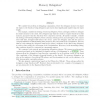9520 search results - page 1880 / 1904 » is 2011 |
101
click to vote
CRYPTO
2011
Springer
13 years 11 months ago
2011
Springer
Deterministic public-key encryption, introduced by Bellare, Boldyreva, and O’Neill (CRYPTO ’07), provides an alternative to randomized public-key encryption in various scenari...
101
click to vote
CRYPTO
2011
Springer
13 years 11 months ago
2011
Springer
Secure computation enables mutually suspicious parties to compute a joint function of their private inputs while providing strong security guarantees. Amongst other things, even i...
105
click to vote
CRYPTO
2011
Springer
13 years 11 months ago
2011
Springer
We consider the problem of delegating computation, where the delegator doesn’t even know the input to the function being delegated, and runs in time significantly smaller than ...
126
click to vote
CRYPTO
2011
Springer
13 years 11 months ago
2011
Springer
In CRYPTO 1997, Canetti et al.put forward the intruiging notion of deniable encryption, which (informally) allows a sender and/or receiver, having already performed some encrypted...
124
click to vote
CRYPTO
2011
Springer
13 years 11 months ago
2011
Springer
In this paper, we initiate a study of zero knowledge proof systems in the presence of sidechannel attacks. Specifically, we consider a setting where a cheating verifier is allow...

